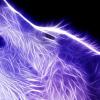Seeking compounds with Metabotropic Glutamate Receptor action
#31
Posted 19 July 2017 - 10:24 PM
#32
Posted 20 July 2017 - 04:57 PM
Acetyl-cysteine
l-theanine
fasoracetam
I've read l-theanine can increase glutamate sensitivity in people with excess glutamate
It seems so but it's a weird relationship. I almost certainly have a defect of the gene that breaks down glutamate to gaba (normal, cause of autistic rage fits) which causes me to become very enraged and restless if I eat anything with too much gelantin, take too much l-glutamine, drink caffeine, etc.
If I have eaten gummy bears (which enrages me more than anything) then l-theanine doesn't seem to worsen or improve it, though creatine works almost instantly to remove the rage (because it competes with glutamate for uptake), which is funny since l-theanine is touted as decreasing glutamate.
However, if I take a high dose of l-theanine then I tend to get symptoms of high serotonin like irritability, fatigue, etc., and the symptoms of high serotonin are in turn almost certainly caused by overactivity of the nmda receptor (since all other agonists do the same).
A very low dose, like under 50mg(?), doesn't seem to cause any issues for the most part, but instead seems to help with all sorts of issues.
Interestingly, I recently found out that gaba-a agonists (or so it seems) worsen my pseudohallucinations while nmda agonists (not all) tend to remove them 99%, though l-theanine for a short while after taking it can also worsen my pseudohallucinations (conversion to gaba?) whereas a few minutes after worsening them it can do the opposite and improve them. But sometimes it does the one thing and other times it does the opposite.
It's a weird supplement.
#33
Posted 28 August 2017 - 07:59 AM
Puerh tea, a possible Mglur5 inhibitor?
https://www.ncbi.nlm.nih.gov/pmc/articles/PMC5533841/
Pu-erh Tea Inhibited the Expression of mGluR5:
To further validate the inhibition of the expression of the mGluR5, several concentrations of pu-erh tea, 50 μM CHPG (a selective mGluR5 agonist) and 50 μM MPEP (a selective mGluR5 antagonist) were added to SH-SY5Y cells and followed by incubation for 12 h. There were no effects on the growth of SH-SY5Y at the concentration of 62.5 μg/mL (Fig. (Fig.3c).3c). The expression of mGluR5 was markedly reduced compared to the control when cells were treated with 62.5 μg/mL of pu-erh tea for 12 h compared to the control (Fig. (Fig.5a,5a, b). When SH-SY5Y cells were treated with 62.5 μg/mL of pu-erh tea for various times, pu-erh tea markedly inhibited the expression of mGluR5 compared to the control (Fig. (Fig.5d,5d, e). Compared to black and green teas, treatment with pu-erh tea for 12 h significantly inhibited the expression of mGluR5 (Fig. (Fig.5g,5g, h).
Effects of Pu-erh Tea on Neuronal Injury:
Increase in extracellular levels of glutamate leads to activation of mGluR5 and a strong excitatory neurotoxicity, resulting in neuronal swelling and necrosis. To confirm that pu-erh tea protects cells from nerve injury, SH-SY5Y cells were incubated with pu-erh tea before treatment with L-glutamate (L-Glu). The nuclear morphology of SH-SY5Y cells was examined after staining with Hoechst 33342. Compared to black and green teas, 12-h treatment with 62.5 μg/mL of pu-erh tea reduced the number of hallmarks of apoptosis induced by 160 mM L-Glu, whereas the mGluR5 agonist CHPG increased and the mGluR5 antagonist MPEP decreased the number of apoptosis (Fig. (Fig.66a).
Pu-erh Tea Prevents Epilepsy by Inhibiting mGluR5:
IP3 and DAG, as second messengers, play important roles on in intracellular messenger transduction. These two substances stimulate neurons and can cause neuronal damage if present in excess. We accordingly assayed the contents of IP3 and DAG in the hippocampus by ELISA to confirm the effect of pu-erh tea on prevention of epilepsy. The results showed that IP3 and DAG were increased in epilepsy and decreased under intragastric administration of pu-erh tea (Fig. (Fig.7a,7a, b). Histological images using HE staining showed that after epilepsy rat hippocampus showed injury, whereas before intragastric administration of pu-erh tea or diazepam, rat hippocampus showed no changes compared to the control
In this study, we discovered that pu-erh tea downregulated the transcription and translation of mGluR5 by Affymetrix Expression microarrays experiments and Western blot. Pu-erh tea also protected SH-SY5Y cells against apoptosis induced by L-glutamate (L-Glu) and alleviated epilepsy behaviour by inhibiting the expression of mGluR5. The results identified mGluR5 as a target for the treatment of neurological and psychiatric disorders and suggested that pu-erh tea might be a potential natural source of protection against neurodegenerative diseases associated with mGluR5. Accordingly, the aim of this study was to identify the protective mechanisms of pu-erh tea against injury to neuronal cells in vitro and in vivo.
#34
Posted 28 August 2017 - 10:16 AM
Puerh tea, a possible Mglur5 inhibitor?
https://www.ncbi.nlm.nih.gov/pmc/articles/PMC5533841/
Pu-erh Tea Inhibited the Expression of mGluR5:Effects of Pu-erh Tea on Neuronal Injury:
Pu-erh Tea Prevents Epilepsy by Inhibiting mGluR5:
I had no idea that mglur5 induced rage could potentially also be connected to neurodegeneration.. that's scary to think about
#36
Posted 16 July 2018 - 05:26 AM
Forskolin
Artichoke extract
Suma
Jiaogulan
NAC
Theanine
#37 Guest_Funiture2_*
Posted 03 February 2019 - 10:59 PM
Evidence that Group II activation decreases reward-seeking behavior for cocaine, alcohol, and food. This is consistent with their effects on dopamine regulation.
This information could be relevant to people dealing with alcoholism, drug addictions, or other addictive behaviors
https://www.ncbi.nlm...pubmed/29220747
Effects of group II metabotropic glutamate receptor modulation on ethanol- and sucrose-seeking and consumption in the rat.
"Systemic administration of the mGluR2/3 agonist LY37 significantly reduced ethanol- and sucrose-seeking."
https://www.ncbi.nlm...pubmed/16703399
The group II metabotropic glutamate receptor agonist, LY379268, inhibits both cocaine- and food-seeking behavior in rats.
"These results support a potential therapeutic role for mGluR2/3 agonists on relapse of cocaine-seeking. However, doses that inhibited cocaine-seeking were only threefold lower than those inhibiting food-seeking, indicating possible unacceptable nonspecific effects. In addition, the NAc core is one site of action where the mGluR2/3 agonists elicit effects on reward-seeking behavior."
https://www.ncbi.nlm...pubmed/20555310
The mGluR2 positive allosteric modulator BINA decreases cocaine self-administration and cue-induced cocaine-seeking and counteracts cocaine-induced enhancement of brain reward function in rats.
"The higher selectivity of BINA compared with an mGluR2/3 agonist for drug- vs food-motivated behaviors suggests a therapeutic role for mGluR2 PAMs for the treatment of cocaine addiction and possibly other drugs of abuse.
In a similar manner: Group I antagonism has a similar effect:
https://www.ncbi.nlm...pubmed/19897175
Metabotropic glutamate receptor 5 activity in the nucleus accumbens is required for the maintenance of ethanol self-administration in a rat genetic model of high alcohol intake.
"Microinjection of the mGluR5 antagonist MPEP in the nucleus accumbens reduced ethanol self-administration at a dose that did not alter locomotor activity. By contrast, infusion of the mGluR2/3 agonist LY379268 in the nucleus accumbens reduced self-administration and produced nonspecific reductions in locomotor activity."
Edited by Furniture, 03 February 2019 - 11:03 PM.
#38 Guest_Funiture2_*
Posted 03 February 2019 - 11:18 PM
Icariin, a natural flavonol glycoside found in Horny Goat Weed and other related plants:
https://www.ncbi.nlm...pubmed/28395974
Antidepressant-like activity of icariin mediated by group I mGluRs in prenatally stressed offspring.
"RESULTS:
The results indicated that prenatal restraint stress (PRS) resulted in several behavioral anomalies. Treatment with icariin relieved the elevated protein and mRNA levels of group I mGluR receptors as well as the diminished protein and mRNA levels of EAAT2 in the PRS male offspring.
CONCLUSIONS:
Collectivity, the data support that icariin ameliorates PRS-induced depressive-like behavior via regulating expression of mGluR1, mGluR5 and EAAT2 in the hippocampus."
Edited by Furniture, 03 February 2019 - 11:18 PM.
#39
Posted 17 November 2023 - 09:28 PM
So to summarize the responses here, these are the compounds, nootropics, & herbs with some evidence to show they interact with mGluRs:
Acetyl-Carnitine
NAC
Suma Root/Brazilian Ginseng
Fasoracetam
Theanine
Nicotine
Nefiracetam
Sarcosine
Pu-erh Tea
Icariin
Let me know if I missed any!
Edited by Furniture, 17 November 2023 - 09:52 PM.
#40
Posted 17 November 2023 - 09:40 PM
If anyone is interested, I created another thread specifically for approved medications that antagonize (or negatively modulate) mGluR5 and mGluR1. This current thread was asking a much broader question (that is, asking for any compounds whether medications, supplements, nootropics, or herbs that affect any of the metabotropic glutamate receptors). However, I've become much more interested in approved medications that antagonize mGluR5 and/or mGluR1 specifically. The only one I've found so far that is approved for clinical use is Acamprosate (Campral). See new thread for evidence:
https://www.longecit...e-campral-does/
Basimglurant (a selective negative allosteric modulator of mGluR5) is currently in Phase 2 of drug trials for Pain associated with TN (Trigeminal Neuralgia) & Seizures in TSC (Tuberous Sclerosis Complex) by the pharmaceutical company Noema Pharma.
https://noemapharma.com/pipeline/
Basimglurant has also recently (about a year ago) received Fast-Track Designation from the FDA:
https://www.empr.com...inal-neuralgia/
So, we may see it available in the next year or so
(Also, I was the original poster of this topic, but for some reason all of the content associated with my account has been moved into a dead Guest account called "Guest_Funiture2_*". I have no idea why)
Edited by Furniture, 17 November 2023 - 09:56 PM.
Also tagged with one or more of these keywords: serotonin, nootropic, nmda
0 user(s) are reading this topic
0 members, 0 guests, 0 anonymous users




















































